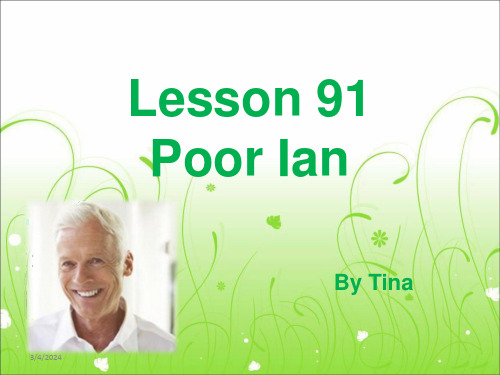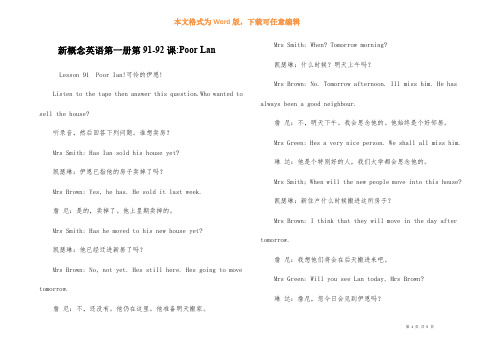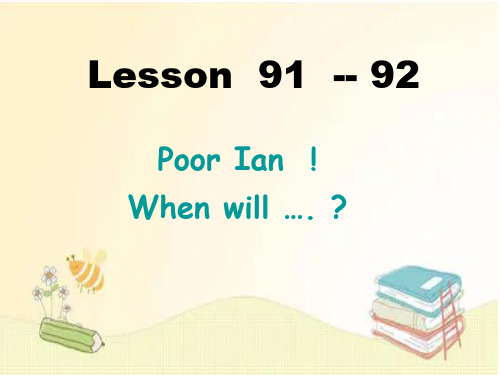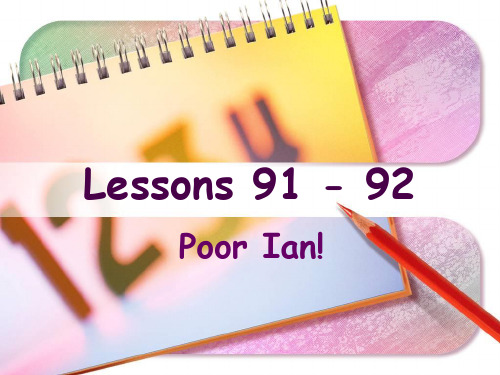新概念英语第一册91-92课笔记.doc
(完整版)新概念第一册Lesson91-92

come to work→work等
• 现在完成时可表示持续到现在的动作或 状态,动词一般是延续性的,如
• live, teach, learn, work, study, know.
• 过去时常用的非持续性动词有: • come, go, leave, start, die, finish,
become, get married.
特疑词+ have (has)+主语+p.p?
(2) 表示动作发生在过去某个不确定的时间, 但对现在留下了某种影响和结果。 常被just、already、yet 等副词修饰。
-Have you had lunch yet? 你(已经)吃午饭了吗? -Yes, I have. I‘ve just had it. 我刚刚吃过。(现在我不饿了)
(强调动作,过程)
move out (of) 搬出来
move away
搬走
move from…to…
从…搬到…
②感动,打动
This story moved me. 这个故事感动了我。 The news moved him very much. 这消息使他很感动。
Байду номын сангаас
★ miss [mis] v. 想念,思念
★ person ['pə:sən] n. 人
He is a nice/good person. 他是个好人。 in person 亲自,直接的 He will go to get the money in person. 他将亲自去取钱。
★ personal adj. 个人的,私人的
['pə:sənəl]
• The patient is lying still. • 病人安静地躺着。
新概念英语第1册第91-92课课重点语法

新概念英语第1册第91-92课课重点语法第91-92课的内容:一、重要句型或语法1、一般将来时表示将来会发生的动作或状态,形式为will do,如:He will come here tomorrow./ They will be in Shanghai next week.二、课文主要语言点Has Ian sold his house yet? Yes, he has. 1)可简单复习一下现在完成时的内容。
2)注意人名Ian的发音He sold it last week. 1)可提问学生为什么此处动词要用一般过去时。
2)注意sell的过去式和过去分词都是sold。
Has he moved to his new house yet? No, not yet. 1)注意对比本句中的move to(搬到)和下文中的move into(搬进,要接宾语)和move in(搬进,不接宾语)的区别。
2)not yet,还没有。
He's still here. He's going to move tomorrow. 可复习be going to do的用法,同时对比与will do的区别:be going to do侧重表达主观打算或意愿。
When? Tomorrow morning? No. Tomorrow afternoon. 两个问句都采用了简略形式,因为口语中往往无需重复上文已经明确的信息,回答也采用简略形式。
完成问句应该是:When is he going to move? Is he going to move tomorrow morning?I'll miss him. 注意提醒will do的缩略形式:'ll do。
He has always been a good neighbour. 本句话可以作为常用句型识记运用:sb. has always been a good ...。
新概念英语第一册第91-92课-Poor-Lan

新概念英语第一册第91-92课:Poor LanLesson 91 Poor Ian!可怜的伊恩!Listen to the tape then answer this question.Who wanted to sell the house?听录音,然后回答下列问题。
谁想卖房?Mrs Smith: Has Ian sold his house yet?凯瑟琳:伊恩已指他的房子卖掉了吗?Mrs Brown: Yes, he has. He sold it last week.詹尼:是的,卖掉了。
他上星期卖掉的。
Mrs Smith: Has he moved to his new house yet?凯瑟琳:他已经迁进新居了吗?Mrs Brown: No, not yet. Hes still here. Hes going to move tomorrow.詹尼:不,还没有。
他仍在这里。
他准备明天搬家。
Mrs Smith: When? Tomorrow morning?凯瑟琳:什么时候?明天上午吗?Mrs Brown: No. Tomorrow afternoon. Ill miss him. He has always been a good neighbour.詹尼:不,明天下午。
我会思念他的。
他始终是个好邻居。
Mrs Green: Hes a very nice person. We shall all miss him.琳达:他是个特别好的人,我们大学都会思念他的。
Mrs Smith; When will the new people move into this house?凯瑟琳:新住户什么时候搬进这所房子?Mrs Brown: I think that they will move in the day after tomorrow.詹尼:我想他们将会在后天搬进来吧。
Mrs Green: Will you see Lan today, Mrs Brown?琳达:詹尼,您今日会见到伊恩吗?Mrs Brown: Yes, I will.詹尼:是的,我会见到他。
新概念一 lesson91-92 (完整版)

New words and expressions
• poor [ puE ]
adj.
3)笨拙的,差劲的
poor jokes 差劲的笑话
a poor excuse 笨拙的借口
New words and expressions
• poor [ puE ]
adj.
3)笨拙的,差劲的 sth
be poor at 不擅长….. doing sth eg: My daughter is poor at swimming.
( D)7.Mr smith _______________to Tokyo and he will be back in
a week • A. has been B. has visited C. has sent D. has gone
( B)8.They___________________ China for two years
Lesson 91 -- 92
Poor Ian ! When will …. ?
new words
• 1 believe [bi'li:v] v.相信,认为 • 7 because [bi'kɔz] conj.因为
• 2 may [mei] (用于请求许可)可以 • 8 retire [ri'taiə] v.退休
new words
New words
still [ stil ]
person [ `pE:sEn ]
adv.还,仍旧 move [mu:v ]
v.搬家 miss [ mis ]
n.人 people [ `pi:pEl]
n.人们
v.想念,思念
poor [ puE ]
新概念英语第一册91-92课

Poor Ian!
New words and expressions
still adv. move v. miss v. neighbour n. person n. people n. poor adj.
还,仍旧 搬家 想念,思念 邻居 人 人们 可怜的
引导宾语从句的关联词有从属连词,疑问代词, 疑问副词,缩合连接代词,缩合连接副词等。
Grammar--宾语从句
I am afraid that you can't see him today. 我恐怕你今天见不到他。 (关联词是从属连词that)
在非正式文体中关联词that常被省去。 eg:I hope you can come tomorrow. 我希望你明天能够来。 (that省略)
JENNY:
No, not yet. He's still here. He's
going to move tomorrow.
move to 搬家到... eg:All her family have moved to the US.
她全家人都已经搬到美国去住了。
完整的回答: He hasn't moved to his new house
1)一般将来时表示将来某一时刻的动作、状态以 及打算。该时态一般与表示将来意义的时间状语 连用。
tomorrow this month the day after tomorrow next week in two days' time from now on in the future
Grammar--宾语从句
用作宾语的从句叫做宾语从句,即充当宾语成份 的不是一个单词或词组,而是一个句子。
新概念第一册Lesson 91-92知识点及拓展

Lesson 91-92Poor Ian!CATHERING: Has Ian sold his house yet?JENNY: Yes, he has. He sold it last week.CATHERING: Has he moved to his new house yet?JENNY: No, not yet. He's still here. He's going to movetomorrow.CATHERING: When? Tomorrow morning?JENNY: No. Tomorrow afternoon. I'll miss him.He has always been a good neighbour.LIDA: He's a very nice person. We'll all miss him. CATHERING: When will the new people move into thishouse?JENNY: I think that they'll move in the day aftertomorrow.LINDA: Will you see Ian today, Jenny?JENNY: Yes, I will.LINDA: Please give him my regards.CATHERING: Poor Ian! He didn't want to leave this house.JENNY: No, he didn't want to leave, but his wife did!1. Has Ian sold his house yet?Has he moved to his new house yet?--yet 己经,还(疑问句,否定句)--already (肯定句)--My father has already come home form work.(already置于助动词与实义动词之间)--Has your father come home yet?(yet一般放在句末)--My father hasn't come home from work yet.2. He sold it last week.一般过去时,强调“上周”这个时间所发生“卖房”的这个动作。
新概念课堂笔记第一册Lesson91-92

新概念英语课堂笔记第一册Lesson 91-92Word Studystill【用法】adv. 还,仍旧;还要,甚至更;静止地adj. 静止的,不动的;寂静的【例句】I still don’t understand what he meant. 我还是不明白他是什么意思。
She was still beautiful at the age of 46. 她46岁时依然美丽。
It was hot yesterday, but it’s still hotter today. 昨天很热,然而今天甚至还要热些。
She looked very ill last week and this week looks still worse. 上星期她看上去病的很厉害,而这个星期看来更不行了。
He is sitting still. 他一动不动地坐着。
The patient is lying still. 病人安静地躺着。
The doctor asked me to keep still. 医生叫我不要动。
How still everything is! 一切是多么寂静啊!The night was very still. 那天晚上很宁静。
move【用法】v. 搬家;搬动,移动;使感动【词组】move to 搬到……move sth. away 搬开;移走move on 朝前走;继续移动move about 走来走去move in 迁入move out 迁出【扩展】movement n. 移动;搬动;运动;活动movable adj. 可移动的moved adj. 感动的moving adj. 令人感动的,感人的【例句】The Smiths are going to move to New York. 史密斯一家打算搬到纽约去。
They moved into the new house last month. 他们上个月搬进了新家。
新概念第一册Lesson 91-92知识点及拓展

Lesson 91-92Poor Ian!CATHERING: Has Ian sold his house yet?JENNY: Yes, he has. He sold it last week.CATHERING: Has he moved to his new house yet?JENNY: No, not yet. He's still here. He's going to movetomorrow.CATHERING: When? Tomorrow morning?JENNY: No. Tomorrow afternoon. I'll miss him.He has always been a good neighbour.LIDA: He's a very nice person. We'll all miss him. CATHERING: When will the new people move into thishouse?JENNY: I think that they'll move in the day aftertomorrow.LINDA: Will you see Ian today, Jenny?JENNY: Yes, I will.LINDA: Please give him my regards.CATHERING: Poor Ian! He didn't want to leave this house.JENNY: No, he didn't want to leave, but his wife did!1. Has Ian sold his house yet?Has he moved to his new house yet?--yet 己经,还(疑问句,否定句)--already (肯定句)--My father has already come home form work.(already置于助动词与实义动词之间)--Has your father come home yet?(yet一般放在句末)--My father hasn't come home from work yet.2. He sold it last week.一般过去时,强调“上周”这个时间所发生“卖房”的这个动作。
- 1、下载文档前请自行甄别文档内容的完整性,平台不提供额外的编辑、内容补充、找答案等附加服务。
- 2、"仅部分预览"的文档,不可在线预览部分如存在完整性等问题,可反馈申请退款(可完整预览的文档不适用该条件!)。
- 3、如文档侵犯您的权益,请联系客服反馈,我们会尽快为您处理(人工客服工作时间:9:00-18:30)。
Lesson 91 Poor Ian![课文]CATHERING: Has Ian sold his house yet?JENNY: Yes, he has. He sold it last week.CATHERING: Has he moved to his new house yet?JENNY: No, not yet. He's still here.He's going to move tomorrow.CATHERING: When? Tomorrow morning.JENNY: No. Tomorrow afternoon. I'll miss him.He has always been a good neighbour.LIDA: He's a very nice person.We'll all miss him.CATHERING: When will the new people move into this house?JENNY: I think that they'll move in the day after tomorrow.LINDA: Will you see Ian today, Jenny?JENNY: Yes, I will.LINDA: Please give him my regards.CATHERING: Poor Ian!He didn't want to leave this house.JENNY: No, he didn't want to leave, but his wife didstill [stil]ad.还,仍旧move [mu:v]v.搬家miss [mis]v.想念,思念neighbour ['neibə] n.邻居person ['pə:sn] n.人people ['pi:pl] n.人们poor [puə] a.可怜的★still adv. 还,仍旧① adv. 还是,仍然I still can’t decide where to go. 我还是不能决定去哪儿。
She was still beautiful at the age of 46. 她46岁时依然美丽。
I still use the watch you gave me. 我还在用你给我的那块表。
I still don’t understand what he meant. 我还是不明白他是什么意思。
②adv. 静止地;安静地He is sitting still. 他一动不动地坐着。
The patient is lying still. 病人安静地躺着。
Please stand still while I take your picture. 我为你拍照时,请站好别动。
③ adv. 还要,甚至更She looked very ill last week and this week looks still worse.上星期她看上去病得很厉害,而这个星期看来仍然很差。
★move v. 搬家;感动①v. 搬到;move from … to …从…搬到…They moved form Nanjing to Shenshen. 他们从南京搬到深圳。
move to 搬到……地方We are going to move to a house in the country. 我们将要搬到乡下的房子。
move in 搬进(强调结果)move into 搬进(强调由外到内的过程)move out 搬出来move away 搬走②v. 移动;Don’t move that chair, because I’ve just painted it. 请不要搬动那张椅子,因为我刚刚漆过。
The teacher asked her to move to the front of the classroom. 老师请她坐到教室的前面去。
Move along, please. 往前走。
③v.使感动,使动心Her song moved us greatly. 她的歌深深地打动了我们。
His story moved us to tears. 他的故事感动得我们流泪。
The story moves me. 这个故事感动了我。
★miss v. 想念,思念① v. 想念,惦念We will miss you very much if you move.如果你搬家,我们会想你的。
I really miss my hometown. 我真的很想念我的家乡。
② v.注意到…的不在When did you miss your bag? 你什么时候发现提包不见的?③v. 错过;失去机会;未做到;I missed a good chance. 我失去一次机会。
They missed the bus and walk home. 他们没有赶上公共汽车就走回家了。
He overslept and missed his train. 他睡过了头,错过了他那班火车。
I missed an opportunity of realizing my dream.我错过了一个可能实现自己梦想的机会。
miss doing 未能I missed buying the magazine. 我没有买到这本杂志。
I missed seeing him yesterday afternoon. 昨天下午我没有看到他。
★neighbour ['neibə] n.邻居He and I are next-door neighbour. 他和我比邻而居。
(next-door neighbour隔壁邻居)a good neighbour 好邻居neighbourhood 四邻,邻近地区This is a quiet neighbourhood. 这一带很安静。
He is going to move into the neighbourhood. 他要搬到这一地区。
in the neighbourhood of 在…附近(意思与 near相同)I want to live in the neighbourhood of my office.我想住在办公大楼的附近。
I want to live near my office.★person n. 人He is a nice person.他是个好人。
Who is that person? 那个人是谁?in person 亲自,直接地He is will go to get money in person. 他将亲自去取钱。
personal adj. 个人的;私人的a personal letter 一封私人信件a personal conversation 私人谈话personality 人格personality manager 人事管理者HR=Human Resource 人力资源部★people n. 人们There are a lot of people in the street.街上有很多人。
ten people 十个人the peoples 民众,人民,国民government of the people, by the people, for the people 民有民治民享的政府(林肯演说中的名言)the peoples of China and USA(指两国人民,用复数形式)★poor [puə] a.可怜的①adj.可怜的The poor old woman had no one to talk to.那个可怜的老人找不到人跟他说话。
Poor fellow 可怜的人!Poor thing 可怜的人!②adj.贫穷的 (反义词) rich adj.富有的a poor man 贫穷的人a poor village 贫穷的村庄the poor 穷人(指的是一类人,用作复数)We should help the poor.我们应该帮助穷人。
③adj.笨拙的,差劲的poor jokes 差劲的笑话a poor excuse 笨拙的借口be poor at sthbe poor at doing sth 不擅长be good at sthbe good at doing sth 擅长My daughter is poor at swimming. 我的女儿不擅长游泳。
[语法]一般将来时①概念:打算或将来要发生(做)的事情。
一般将来时表示将来某一时刻的动作、状态以及打算。
该时态一般与表示将来意义的时间状语连用。
与一般将来时连用的时间短语:tomorrow 明天this month 本月the day after tomorrow 后天next week 下周in two day s’ time 两天之后from now on 从现在起in the future 将来in a day’s time (一天以后),in a year’s time (一年以后),in two weeks’ time (两周后),in three months’ time (3个月后)等等。
②一般将来时的形式:主语 + will/shall + 动词原型will用于所有人称,shall可用于第一人称I和we(在当代英语中,不管什么人称,人们都喜欢用will)。
will除表示纯粹的将来时间外,还表示说话人的意图和意愿,而shall除了表示将来时间外同时还表示说话人的责任或决心。
Shall [ʃæl; 弱ʃəl; ʃl; ʃə; ʃ] Will [wil; 弱wel]③一般疑问句是将助动词will/shall提前,否定是在will/shall的后面加not。
否定缩写:will not = won’t shall not = shan’t肯定句:He will (He’ll) come next week. 他下星期来。
I will (I’ll ) have eggs and toast for breakfast tomorrow morning. 明天早饭我吃鸡蛋和烤面包。
否定句:He will not (won’t) come back next week. 他下周回不来。
He will not (won’t) go to visit her friend this afternoon.他今天下午不会去拜访她的朋友。
疑问句:Will you see him tomorrow morning? 你明天早上会见他吗?_Yes, I will. 肯定回答_No, I won’t. 否定回答Will she post the letter the day after tomorrow? 她后天会把信寄走吗?_Yes, she will. 肯定回答_No, she won’t. 否定回答④除了will/shall外,还可以用其他方法表示将来。
